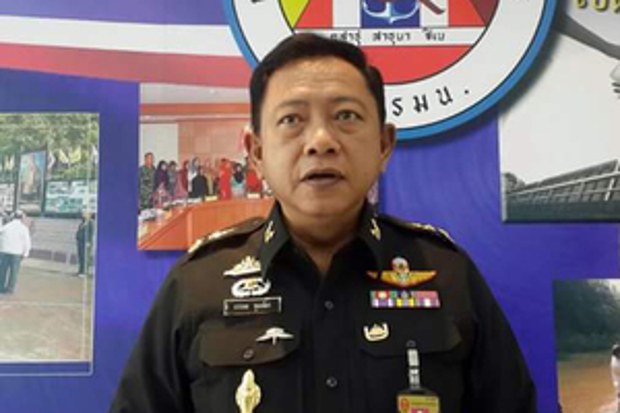Thai Military Questions Torture Claims by Rights Groups
2016.02.11
 Internal Security Operations Command Region 4 spokesman Maj. Gen. Banpot Poonpian speaks to reporters in Bangkok, Feb. 11, 2016.
Internal Security Operations Command Region 4 spokesman Maj. Gen. Banpot Poonpian speaks to reporters in Bangkok, Feb. 11, 2016.
Thailand’s military pushed back on Thursday against a new report by three human rights organizations accusing Thai forces of torturing suspected insurgents in the country’s Deep South.
The Internal Security Operations Command (ISOC) convened a news conference in Bangkok at which a spokesman listed concerns about the report, including questions about its factual accuracy and what authority the three groups had invoked in reviewing government documents cited in it.
ISOC Region 4 spokesman Maj. Gen. Banpot Poonpian went so far as to suggest that “by invoking international laws while forsaking domestic laws when assembling information, could possibly amount to the defamation of involved agencies.”
“We are ready to inspect the facts … but the concern is this report has been disseminated overseas,” he said. “It might create a misunderstanding [of] the facts.”
The Cross-Cultural Foundation (CrCF), the Duay Jai (Hearty Support) Group and Patani Human Rights Organization (HAP) were the rights groups that published the 49-page report, which came out Wednesday.
Among ISOC’s concerns, Banpot asked which laws the groups had used in accessing and reviewing government documents used in their report.
“Have they stumbled on any government officer involved in the act of torture and other cruel, inhuman or degrading treatment?” Banpot told reporters.
Without pointing to specific facts detailed in the report, he also questioned whether it was based one one-sided accounts or old information.
“Has this information not been verified independently?” Banpot said.
‘We rely on cooperation’
The report detailing allegations of torture is based on the accounts of 54 suspected insurgents, aged between 19 and 48, who were taken into custody between 2004 and the end of last year in the Deep South.
Thailand’s predominantly Muslim southern border region is a heavily militarized zone, where martial law is in force and a separatist insurgency has lasted for at least 12 years.
Martial law allows for seven days of detention in a military camp, and an emergency decree allows for seven days of similar custody in any place. With a court’s approval, officials may hold a suspect for up to 30 days.
Since 2004, more than 6,500 people have been killed in violence stemming from the insurgency.
But, according to ISOC’s Banpot, “the number of violent incidences has markedly decreased” as the Thai junta pursues efforts to persuade southern rebels to resume peace talks for the first time since December 2013.
He also claimed that the three organizations published the report to solicit funding from international sources. He added that Thai security personnel were trained every year to respect human rights.
“We rely on cooperation from religious leaders, community leaders, kinship and credible outside organizations to bear witness to all of the processes concerning the enforcement of the law,” Banpot said.
“And after any operation, should there be any doubts, the local agencies would be more than happy to help with an inquiry into their actions.”







